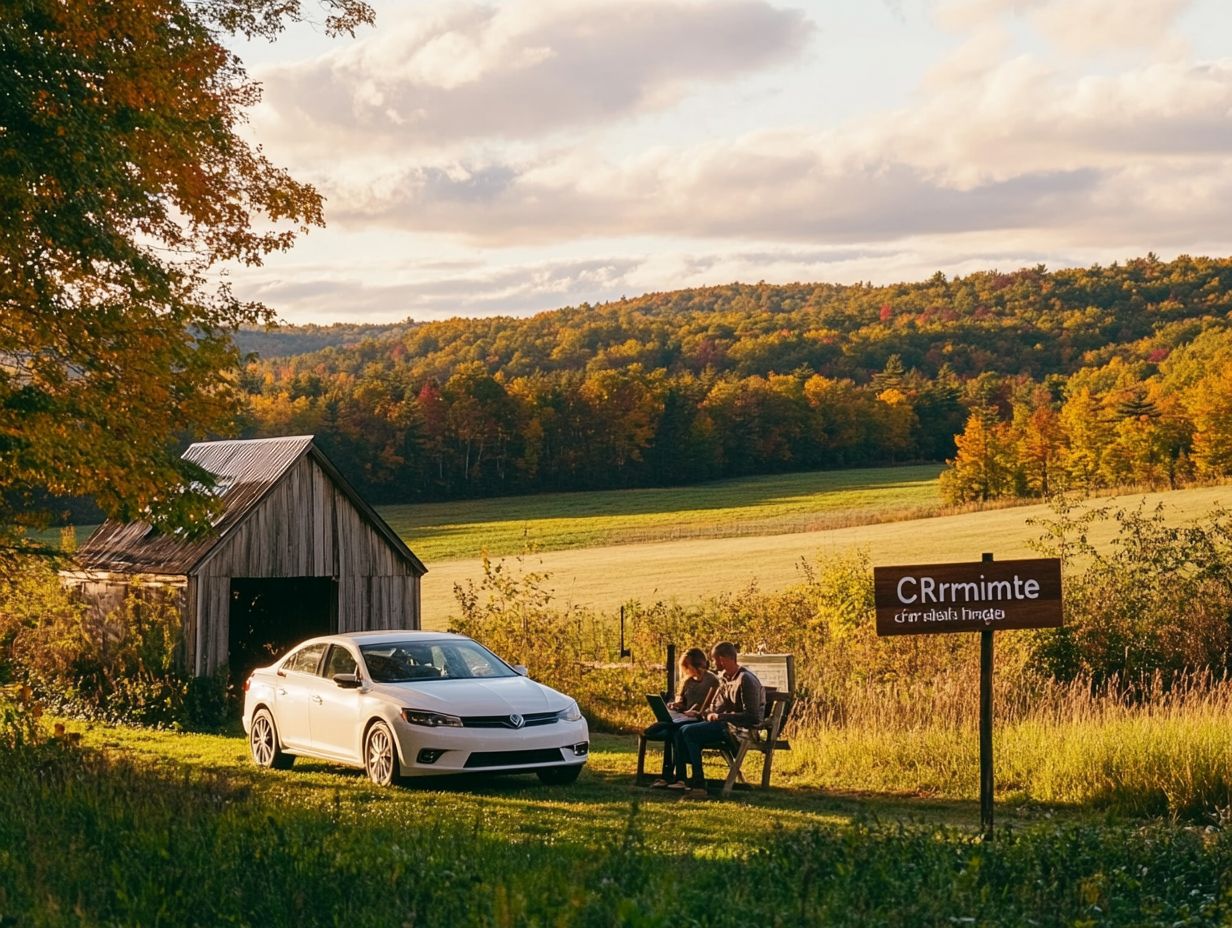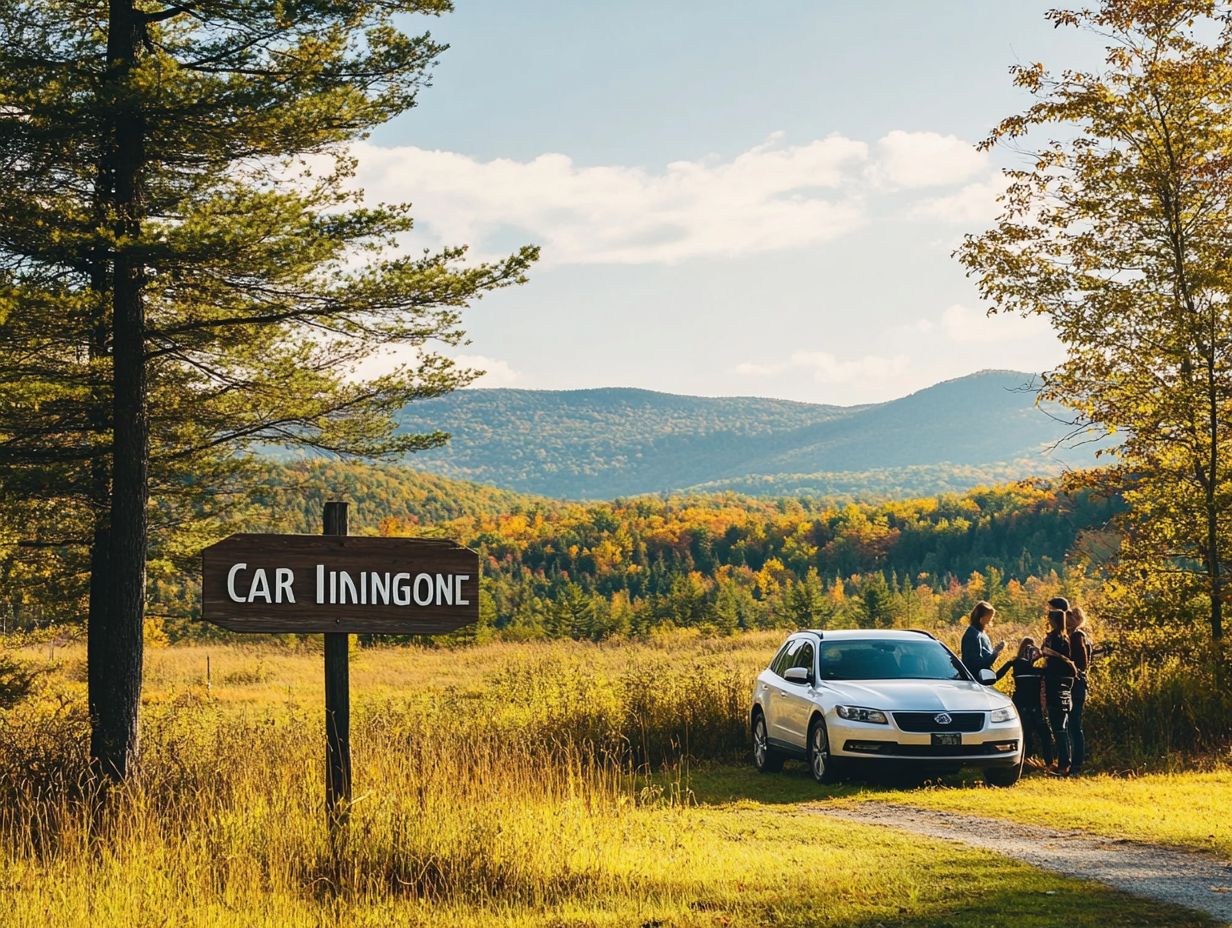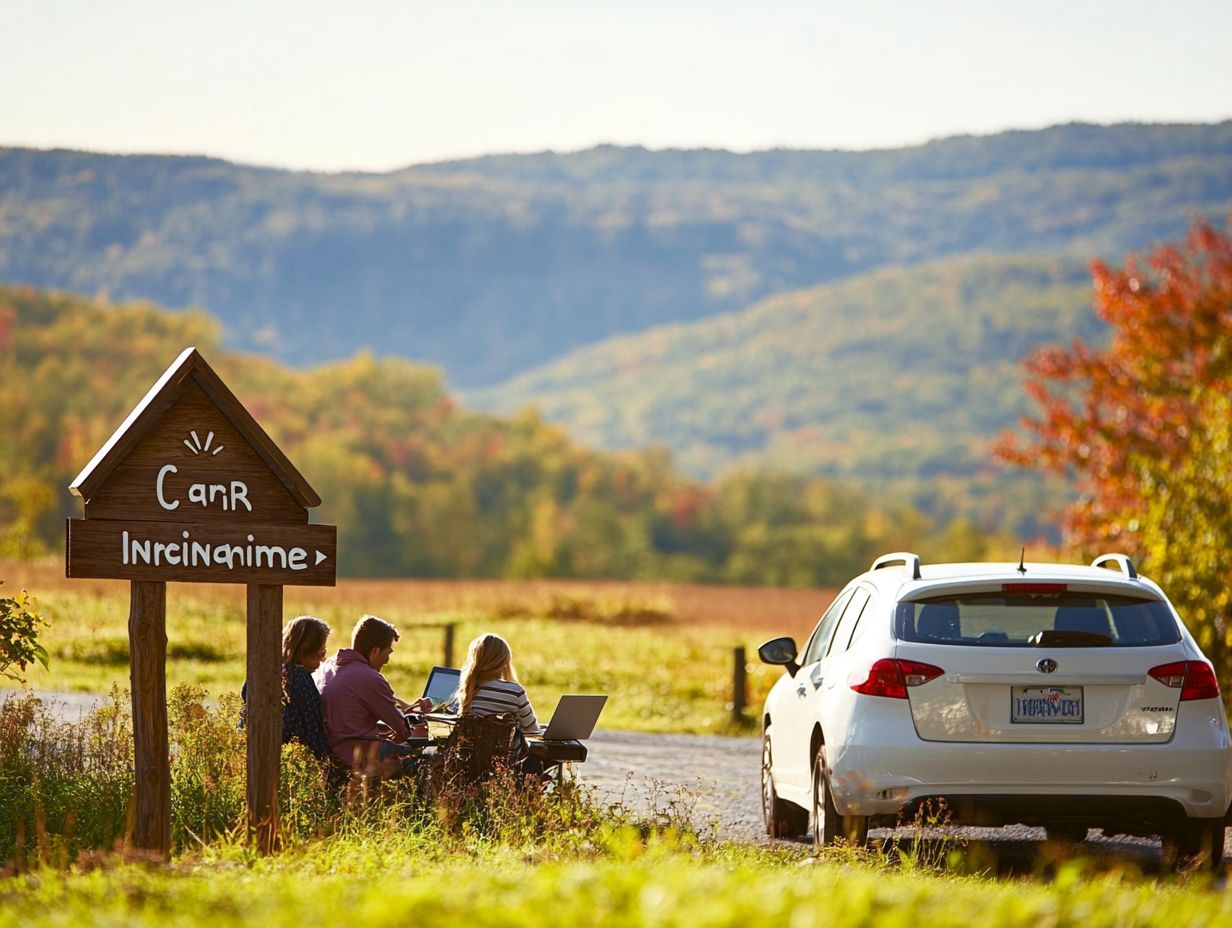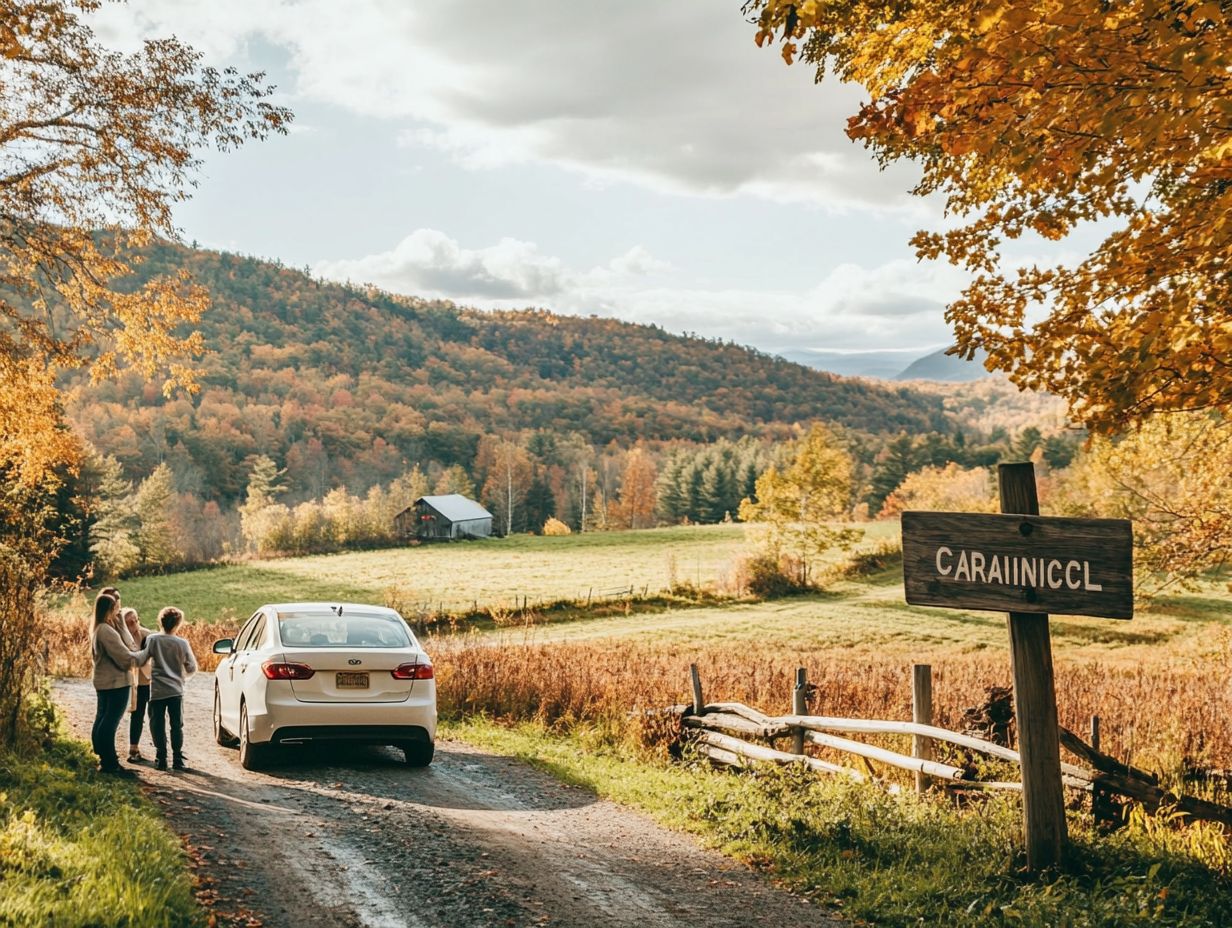Understanding Car Insurance in Vermont
Car insurance transcends mere legal obligation; it’s an indispensable shield for you, your vehicle, and everyone else sharing the road with you.
In Vermont, understanding the minimum insurance requirements is vital for both compliance and your own peace of mind.
This guide will explore the various types of coverage available, the factors that affect insurance rates, and potential discounts that can help reduce your premium.
You’ll also find practical steps to take following an accident, along with insights on how to choose the right policy tailored to your specific needs.
Contents
- Key Takeaways:
- Minimum Car Insurance Requirements in Vermont
- Types of Car Insurance Coverage
- Factors Affecting Car Insurance Rates in Vermont
- Discounts and Savings on Car Insurance
- Steps to Take After an Accident
- Tips for Choosing the Right Car Insurance Policy
- Frequently Asked Questions
- What is car insurance and why is it important in Vermont?
- What types of car insurance are available in Vermont?
- Do I need to have car insurance in Vermont?
- What factors affect the cost of car insurance in Vermont?
- Are there any discounts available for car insurance in Vermont?
- What should I do if I get into a car accident in Vermont?
Key Takeaways:

- Understanding car insurance is crucial for protecting yourself and your vehicle from financial loss in case of an accident.
- Vermont has minimum coverage requirements, but it’s important to consider additional coverage options for better protection.
- Factors like age, driving record, and vehicle type can affect car insurance rates in Vermont, but there are ways to lower premiums through discounts and savings.
What is Car Insurance and Why is it Important?
Car insurance is your essential financial safety net in Vermont, designed to shield you from the potentially devastating financial repercussions of car accidents.
It includes various types of coverage, such as liability insurance, which is required by law, and personal injury protection, which helps you cover medical expenses resulting from injuries sustained in an accident.
Grasping the intricacies of auto insurance is vital for staying compliant with Vermont’s driving laws and insurance requirements.
Beyond these fundamental coverages, insurance for accidents caused by drivers without insurance is crucial in safeguarding you against those who drive without adequate insurance.
Insurance that covers damage to your car from accidents and theft further enhances your financial security by addressing damage to your own vehicle, whether it s due to an accident, theft, or natural disasters.
Each type of coverage serves a specific purpose, collectively ensuring that you can navigate the road with confidence, knowing you re prepared for various unforeseen circumstances.
This understanding not only fulfills your legal obligations but also fosters responsible driving behaviors that benefit the entire community.
Minimum Car Insurance Requirements in Vermont
In Vermont, you ll find that the minimum car insurance requirements compel drivers to maintain liability coverage. This coverage serves as a safeguard against bodily injury and property damage that may arise from car accidents.
By fulfilling this legal obligation, you ensure that you can cover expenses resulting from accidents you cause, creating a safety net for both you and the other party involved.
Having uninsured motorist coverage is essential for protecting against inadequately insured drivers.
State Mandated Coverage Levels
Vermont mandates specific coverage levels for auto insurance that you must adhere to, particularly concerning liability insurance, to avoid civil penalties.
These requirements are designed to ensure that every driver is financially responsible for any bodily injury or property damage they might cause in an accident.
By following these coverage levels, you not only protect yourself but also help maintain the integrity of Vermont’s roadways.
The law specifically outlines minimum liability coverage of $25,000 for bodily injury per person, $50,000 for total bodily injury per accident, and $10,000 for property damage.
If you fail to meet these requirements, you could face civil penalties, including fines and possibly the suspension of your driving privileges. This highlights why compliance is crucial.
These regulations enhance accountability and contribute to overall road safety by ensuring that sufficient resources are available to cover damages.
In doing so, they foster a more secure driving environment for everyone using Vermont’s highways.
Stay protected on the road make sure you understand your insurance options!
Types of Car Insurance Coverage
Understanding the different types of car insurance coverage available in Vermont is crucial for you to choose the policy that best suits your needs. The primary options include:
- Liability insurance: This coverage takes care of bodily injury and property damage to others.
- Collision coverage: This coverage covers damage to your own vehicle.
- Comprehensive coverage: This protects you against incidents that aren’t collision-related.
Personal injury protection (PIP) and Medical Payments (MedPay) are essential as they cover medical expenses for you and your passengers, no matter who s at fault. These components are vital for crafting a well-rounded auto insurance policy.
Liability, Collision, Comprehensive, and Other Options

In Vermont, you can select from various optional auto insurance coverages. This includes liability coverage, collision coverage, and comprehensive coverage, each providing distinct layers of protection tailored to your needs.
These coverage types fulfill legal requirements and offer you peace of mind in diverse situations. Liability coverage is particularly vital; it alleviates the financial burden that can arise from injuries or damages you might cause to others, especially while navigating the state’s scenic but winding roads.
Collision coverage allows you to recover swiftly from an accident, covering repair costs regardless of fault. Comprehensive coverage acts as a safety net against unexpected events, ensuring you re not left stranded due to theft, vandalism, or natural disasters.
Uninsured motorist protection is another important option. It can significantly bolster your financial security, enabling you to address unexpected medical expenses or losses that may occur from accidents involving uninsured drivers.
Factors Affecting Car Insurance Rates in Vermont
Car insurance rates in Vermont are shaped by various factors that you should consider. Your age, driving record, and the type of vehicle you insure all play significant roles.
Young drivers often encounter higher premiums due to their limited experience on the road. Conversely, maintaining a clean driving record can lead to discounts and more favorable rates.
Moreover, the specific make and model of your vehicle can also impact your premiums. Factors such as safety ratings, repair costs, and the likelihood of theft are all taken into account.
Understanding how these elements interact will empower you to make informed decisions about your insurance costs.
Age, Driving Record, Vehicle Type, and Other Factors
When considering auto insurance rates in Vermont, insurers examine several key factors. They look at your age, driving record, and the specific type of vehicle you re insuring.
If you re a young driver or have past traffic violations, such as a DUI, you can expect higher premiums because you re seen as a greater risk. The make and model of your vehicle also matter; high-performance cars typically come with steeper insurance costs due to a higher chance of accidents and theft.
Your driving history is critical. Any civil penalties you ve incurred can significantly reflect your risk profile. For instance, repeat traffic offenses increase the likelihood of future claims, which directly impacts your insurance rates.
If you drive a luxury or specialized vehicle like a sports car or electric model your premiums may be calculated differently, taking into account repair costs and market demand.
Insurers weigh these elements carefully to assess your risk accurately and set premiums that genuinely reflect the likelihood of a loss.
Discounts and Savings on Car Insurance
In Vermont, you can significantly reduce your auto insurance rates through various discounts and savings options. Common discounts are available for maintaining a good driving record, bundling multiple policies, completing driver safety courses, and having vehicles equipped with advanced safety features.
Programs like accident forgiveness can help you retain lower premiums even after a minor mishap, making auto insurance more affordable for you.
Don t forget to shop around for the best rates and ask your insurer about available discounts!
Understanding your car insurance options is essential. Take the time to assess your coverage needs and ensure you are adequately protected.
Potential Ways to Lower Your Premium
You can lower your auto insurance premiums in Vermont. Start by keeping a clean driving record and taking advantage of available discounts.
Review your driving record regularly. This can help you spot issues that may affect your premiums.
Consider enrolling in defensive driving courses or bundling your insurance policies. Opting for accident forgiveness can also help. Regularly comparing quotes from different insurance carriers will help you find the best opportunities for savings.
Reassess your insurance policies regularly. This helps you find new offers or loyalty discounts from your provider.
By actively engaging with your insurance options and committing to safe driving, you can unlock further savings and achieve a better balance between coverage and affordability.
Steps to Take After an Accident

After experiencing a car accident in Vermont, acting quickly is crucial. Your safety and interests depend on it.
First, check for any injuries and call for roadside assistance if necessary. Once it’s safe, remove your vehicle from traffic to prevent further complications.
Next, document the scene with photos and gather information from all involved parties. This will be invaluable when you file a claim with your insurance company.
This critical step will help in recovering costs and assessing responsibility, especially if accident forgiveness applies in your case. Taking these measures thoughtfully can make a significant difference after an accident.
Filing a Claim and Dealing with Insurance Companies
Filing a claim with your insurance company after a car accident in Vermont is essential. It demands meticulous attention to detail.
Insurance companies typically require comprehensive documentation outlining the circumstances of the accident. This includes police reports and witness information to effectively assess responsibility and process claims.
Understanding your rights, particularly concerning accident forgiveness, can significantly impact how your claim is managed and how swiftly you achieve recovery.
To start, establish initial contact with your insurance agent. They will guide you through the entire process and clarify any questions about your specific policy coverage.
This conversation will often involve discussing limits on how much your insurance will pay, as these can greatly influence the outcome of your claim.
Once connected, the agent will request a detailed account of the incident. Gather all relevant information and submit necessary documentation such as photographs of the accident scene, medical reports, and repair estimates to expedite your claim processing.
Navigating these steps with a solid understanding of your policy gives you the power to advocate for your rights effectively and secure a satisfactory resolution.
Tips for Choosing the Right Car Insurance Policy
Choosing the right car insurance in Vermont requires careful thought. Focus on coverage options, insurance rates, and your driving history.
Begin by reviewing the state s minimum insurance requirements. Then, evaluate any additional coverages that might be essential for your specific circumstances.
Furthermore, taking the time to compare quotes from various insurance carriers will give you the power to secure the best value tailored to your coverage needs.
Factors to Consider and Questions to Ask
When selecting a car insurance policy in Vermont, carefully consider several key factors and ask the right questions to ensure you secure the best coverage for your needs.
Examine the different types of coverage. For example, collision coverage helps pay for damages to your car after an accident, while personal injury protection covers medical expenses for you and your passengers. Uninsured motorist coverage protects you if another driver doesn t have insurance.
Keep in mind any unique state requirements that may influence your policy choices, as regulations can vary widely.
Don t overlook the opportunity to explore potential discounts. Having a clean driving record, bundling multiple policies, or featuring modern safety enhancements in your vehicle can lead to noteworthy savings.
Engage in thorough research and reach out to insurance professionals. This empowers you to make well-informed decisions that suit both your financial situation and personal circumstances.
Frequently Asked Questions
What is car insurance and why is it important in Vermont?

Car insurance is a type of financial protection that helps cover the costs of damages or injuries resulting from a car accident. In Vermont, having car insurance isn’t just smart; it’s the law!
What types of car insurance are available in Vermont?
In Vermont, several types of car insurance are available. Liability coverage covers damages and injuries to others in an accident. Collision coverage helps pay for damages to your own vehicle, and comprehensive coverage protects against non-collision-related damages.
Do I need to have car insurance in Vermont?
Yes, it is required by law to have car insurance in Vermont. The minimum requirement is liability coverage, but additional coverage options are also available to help protect you and your vehicle.
What factors affect the cost of car insurance in Vermont?
The cost of car insurance in Vermont can vary depending on factors such as your driving record, age, type of vehicle, and coverage options. Insurance companies also consider the location where the vehicle is primarily driven and the amount of coverage requested.
Are there any discounts available for car insurance in Vermont?
Yes, some insurance companies offer discounts for having a good driving record, completing a defensive driving course, or bundling multiple insurance policies. Always ask your insurance provider about any potential discounts.
What should I do if I get into a car accident in Vermont?
If you are involved in a car accident in Vermont, first exchange information with the other driver(s) and contact your insurance company to report the accident. It is also important to seek medical attention if necessary and follow any instructions from your insurance provider for filing a claim.


